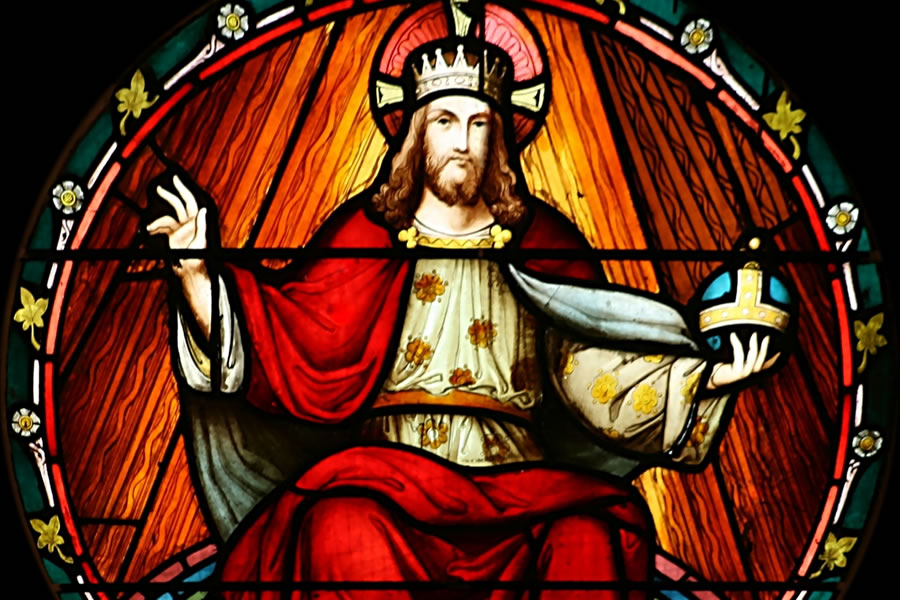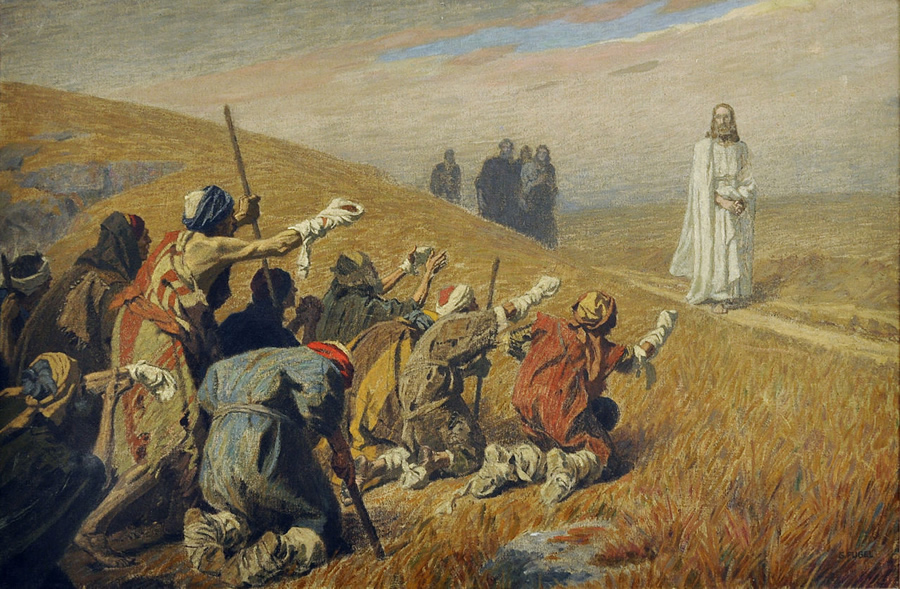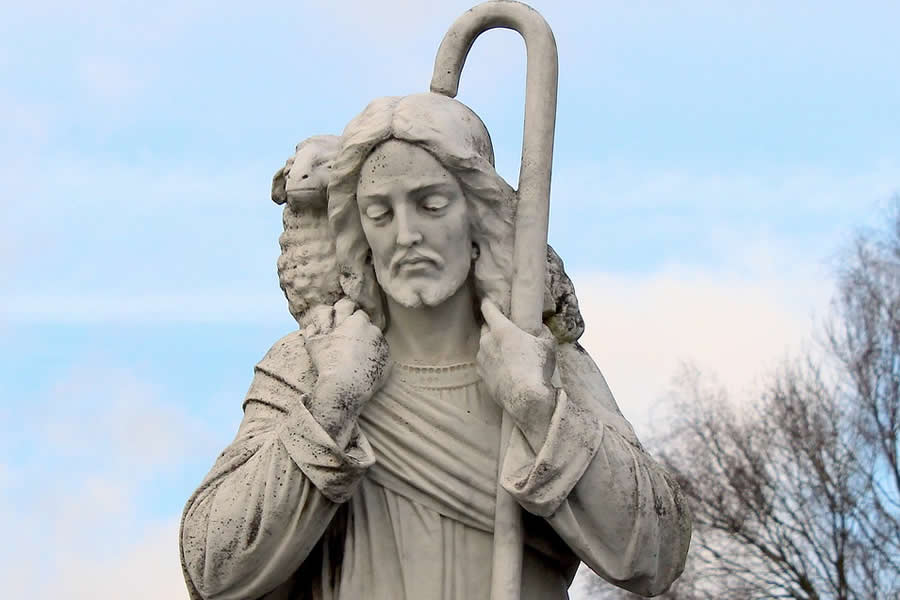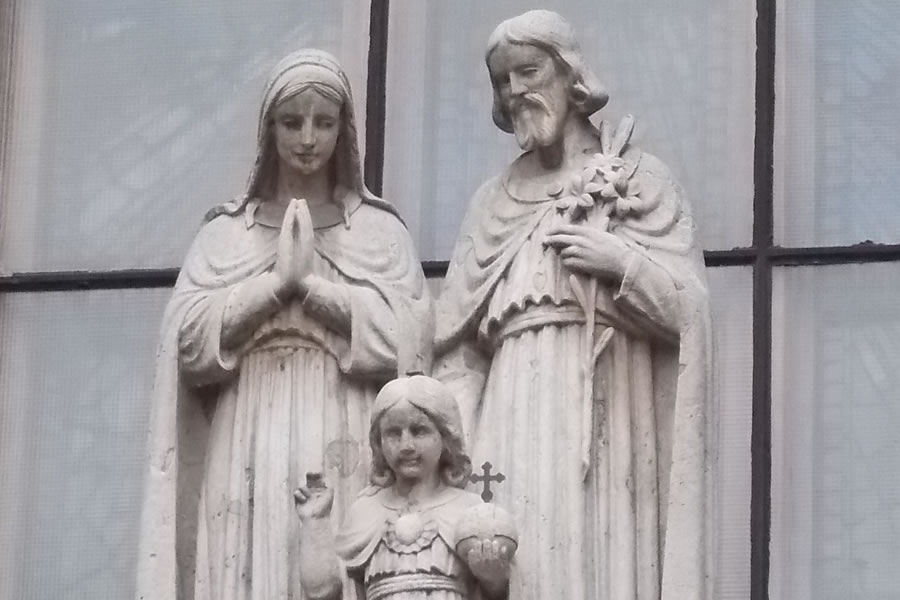
Jesus, Remember Me
11-24-2019Pastoral ReflectionsRev. Brian F. ManningWhen driving around, I observed that some stores, especially mall areas, are putting up their outdoor Christmas decorations. I also saw one house in a nearby town that also is undergoing extensive outdoor decoration. This house is always a magnificent display of Christmas light and joy. I look forward to seeing it in mid-December. I also noticed that advertisements are now stepping up to a higher level of announcing gifts for Christmas. The subtlety which is used in the Summer and Fall about Christmas has been replaced with much bolder announcements. This start up and rev up to Christmas is a sign to me that our Church year is at a near end. Indeed this Sunday is the last Sunday of our Church year. Next Sunday we also start our roll up to Christmas with the First Sunday in Advent. Our scripture at Mass will start to hint about the meaning of the Birth of Jesus Christ, often called the Incarnation. Much like society, we start to dress our church and our life with the possible meaning of Christmas for us. This Sunday, however, the last Sunday of our Church Year, is the great and grand Feast of Our Lord Jesus Chris, King of the Universe; often called simply the Feast of Christ our King. Although our popular culture is fascinated by the daily lives of the Royal Windsors today in Great Britain, we really do not understand what a king or royalty is. We are blessed to live in a democratic republic with everyone as equals. Our faith tradition says that we all are children of God and made royal by our baptism. Our faith tradition tells us that there is no exclusive set of “better people” born by family blood. Indeed, for many of us royalty is an outdated notion. Thus, our Celebration of Christ as our King takes only the good symbols and elements of royalty and kingship. We must leave aside the lesser and darker history of royals and kingship.
READ MORE
Depend on the Lord
11-17-2019Pastoral ReflectionsRev. Brian F. ManningWe are coming close to the very end of the Church year; it is next Sunday that we celebrate the Feast of the Lord Jesus, King of the Universe. This large and loud outpouring of praise and glory to our Savior is a fitting end to the liturgical year of our church. We conclude the telling of the story of Jesus Christ for this past year and we get set this coming week to begin telling his and our story again the following Sunday, the First Sunday in Advent. We must remember that, although we do not always recognize it, each one of us is a different person from who we were 52 weeks ago. When we end the story of Jesus this year, it is different for us from one year ago. When we start the story again, we will and should hear it differently from how we did one year ago. Sickness, health, graduation, success, failure, struggle, new relationships, broken relationships and all sorts of events and happenings have been in our lives. All of these change us in obvious and perhaps subtle ways. Thus, each year when we listen to the Gospel story of Jesus, we should hear it differently. But our greater task now is to ask about the Gospel of this weekend and its possible meaning for us.
READ MORE
Destined to Be with God in Heaven
11-10-2019Pastoral ReflectionsRev. Brian F. ManningIt is common throughout human culture that if you believe there is an afterlife it is often viewed as the fulfillment of the privations and difficulties of this life. Heaven is often seen as a feast of unlimited food and drink; for others, heaven is a warm and safe place free of violence. What about us? We who are primarily overfed, warm and safe people, how do we envision heaven? As our culture often fulfills every comfort and desire that we have, the idea of an afterlife has diminished. Indeed belief in the reality of God has also declined greatly. The “nones” of today are really saying that they believe only in this life, and in fact just in themselves and their singular life. In many ways, the new “temple or church” is the fitness center or gym. In many ways, we have raised our children to come to this belief of themselves as the ultimate focus and end of their lives. Popular culture has made heaven to appear to be a cluster of stained glass “angels” which we hang in front of our windows to capture the sun and make the angels sparkle. What is guiding truth for believers in the Roman Catholic Way of Life is that we do not truly know what heaven is, but by our faith we know that it is. Today’s scripture helps us to deal with the troubling question of eternal life and heaven, which are for some Catholics a difficult question and for other Catholics a clear matter of faith.
READ MORE
God Loves All that Is
11-03-2019Pastoral ReflectionsRev. Brian F. ManningAs we remember, in “Ordinary Time” the Sunday scripture is to help us to focus on the meaning of our lives and how we follow in various ways the Catholic Way of Life. The scripture through its narrative and symbols offers to us many, many possibilities of insight and understanding. Some of these are welcome, and some are not. Our lives today do not include much time for reflection and insight. The time at Mass and the reading of sacred scripture can help us discover and discern ways to make our lives deep and fuller.
It is important to remember that the Book of Wisdom was composed by Jews who were assimilated into the Greek culture of that time and were living in Alexandria, Egypt. Because this book was originally composed in Greek, it was never allowed into the official Canon of Hebrew Sacred Scripture. From sociological history, it is very clear that Alexandria was one of the most important centers of culture and learning in the eastern Mediterranean area. The many Jews who lived in this vibrant city wanted and enjoyed living and relating to people who were very open and also looked for change as a way of life. Thus this book of bible responded to the desires of the people for change, but also gave insights and explanations of the old ways of Judaism.
READ MORE
A Matter of Mercy
10-27-2019Pastoral ReflectionsRev. Brian F. ManningWe make side remarks about someone’s attitude. We think, “What an attitude. Why is he/she giving me that attitude? Who does he/she think they are with that attitude? Wow, does he/she have a great attitude about life. I wish I had that one’s attitude about it all.” On go the possible thoughts or remarks about attitude. We can simply conclude that attitude always matters in life. Attitude is indeed “where it’s at.” We recognize that attitude is far more than opinion, perspective, or viewpoint. It also becomes part of our physical being, such as posture or manners. Attitude, however, is still always far more than mere externals; it is a crucial quality for all of us. Our clothing at times can reflect an attitude, but attitude goes beyond clothes. You can get by with the wrong clothes at times, but never with the wrong attitude. Attitude makes the person, not clothing, because attitude has to do with the inside of us and affects our relationships with people. Attitude, so to speak, is how a person is before other people and with other people. Today’s scripture speaks about attitude and a person of faith.
READ MORE
The Grace to Go on Praying
10-20-2019Pastoral ReflectionsRev. Brian F. ManningThe scripture this weekend helps to reveal the interlocking relationship between prayers that are said and people who are faith-filled pray-ers. Consider how we gather to pray, which helps to form us, and then as we pray, we are formed even more and differently. The act of praying and its content do profoundly affect us. We grow to pray, and then prayer causes growth in us and so it goes on in this cycle of life of prayer. As we think about the readings for this Sunday, keep this philosophical insight in your mind to help process what the Word of God may mean to you this weekend.
Note right away that the first reading lifts up the power of God over human violence. No great acts of war or monstrous machines of destruction can bring about victory in arms, only God can. We are reminded again that God is the giver in life and we are the receivers. God offers and we respond. The reading, however, also highlights two more truths: that we must always persevere in trials and also we must keep trust that God will answer our prayers. In addition, this passage also emphasizes that prayer is greatly strengthened by the community. This passage certainly tells us of the many factors of authentic prayer to God.
READ MORE
Faith: a Treasure to Be Shared
10-13-2019Pastoral ReflectionsRev. Brian F. ManningThe ancient Jewish laws regarding lepers were indeed scary. Although a leper was an outcast beggar, wearing rags, and with terrible skin lesions, the law required that lepers look even worse and shout every time they came near someone by yelling “Unclean! Unclean!” In the Gospel story, the disciples and followers of Jesus must have hit a collective feverish pitch when the ten lepers dared to approach Jesus. Worse than all this “horror” was one of the lepers was a Samaritan, a heretic—to use a term that is thrown around too easily today. Notice that, despite the reaction of the people, Jesus did have pity of on them. He then told them to go to the temple and show themselves to the priests, whose role was to formally declare who was cured of this stigmatizing disease. In the story they leave and make their way, and at some point they are cured. Yet only one of the ten—who else but the Samaritan?—returns to offer thanks. How do you think Jesus felt at this point? Despite this issue, the theme of the Gospel and the first two readings is about faith.
The three readings offer us different perspectives or points of view to discern and learn about faith. The Old Testament launches the theme with a miracle. However, Naaman follows up with an act of gratitude, which results in faith. In the Gospel, in reverse so to speak, the Samaritan’s cure follows faith, which in turn prompts gratitude and praise. Notice how these two particular readings focus on the faith of the receiver of gifts. These readings make it clear that there is no such thing as quiet or anonymous faith. The gift of faith is meant to be seen by others, not bound and locked away. The readings tell us clearly that faith is a treasure to be shared and a reason for joy and hope.
READ MORE
A Conviction of Love
10-06-2019Pastoral ReflectionsRev. Brian F. ManningIn our first reading we learn from Habakkuk that he does not see life in positive and happy ways. Gloom, doom, destruction, and ruin surround him. And we are prompted to ask what is Habakkuk doing about it? He is plainly and boldly complaining! He does not have “the stuff” of New Englanders. No stiff upper lip for Habakkuk. He is letting God have it. Although it is hard to believe, he is exercising his faith. Not through silence and acceptance, but through loud and messy protest. The prophet is sharply demanding that his faithful God do something. And what we know happens: God hears the cries of Habakkuk. God promises that his will shall be done. Note, more importantly, how God also demands that faith be lived out. It appears that God is concerned that faithful people recognize that they can live even in a world beset by evil without being overcome by evil. In our intense world of today, this is essential to recognize and know.
Our Gospel passage from Luke focuses on Jesus addressing his disciples about the problems and difficulties which can arise within the community: These may become sins that can shatter the faith of the “little ones”, the members of the community who have less prominence and little power. He also speaks about the need to forgive one another the inevitable offenses that normally occur among members.
READ MORE
We Need to Help
09-29-2019Pastoral ReflectionsRev. Brian F. ManningI find today’s theme and message about responsibility to be very significant. When times are good, folks tend to think that they personally are responsible for the good times; when times are bad, they look for someone else to blame. Usually we transfer blame onto other people; if that fails to fly, then it is God’s fault; and if that does not work, we excuse our self with all sort of fabricated reasons. If times are good, it is due to us; if times are bad, it is clearly due to someone else or something else. Our prophet Amos in the first reading suffers greatly because of the complacent irresponsibility of the people. The prophet warns the rich of imminent catastrophe, a turn-around in fortune.
Notice how in the Gospel passage Jesus begins his story in the here and now and then ends it in the hereafter. Pay particular attention to the contradiction and confusion of the two main characters: Lazarus and Dives (the rich man). The poor man at the end of the story lies not outside the gate, but in Abraham’s bosom at the banquet of the Kingdom, and the rich man is no longer eating fine foods inside the gates, but is thirsty and far away in a place of misery.
READ MORE
God Alone Is True Justice
09-22-2019Pastoral ReflectionsRev. Brian F. ManningDeacon Ron Gerwatowski: At the Cathedral of the Holy Cross, Boston our parishioner Ronald Gerwatowski was ordained by Cardinal Seán on this past Saturday, September 21, 2019 to the (permanent) Diaconate. Congratulations to Deacon Ron and also to his wife Kathleen and family. Next Sunday, September 29 at the 10:30 AM Mass, Deacon Ron will assist at his first parish Mass and also preach. We wish him God’s grace as he begins his ministry. Deacon Ron will be assigned to our Parish. He will be one of two deacons here. Deacon Guy will continue in his present role.
Pastoral Reflections: Our two thematically connected readings, the Old Testament and the Gospel, speak about messages of justice. These passages in a way shout the message that God alone is true justice. To know this is good, but it does not really still an upset heart. The scripture passages, in fact, are actually challenging our comfort and complacency, our lukewarm ways, our carless stewardship.
READ MORE
God's Heart of Forgiveneness
09-15-2019Pastoral ReflectionsRev. Brian F. ManningThe main theme of the scriptures and prayers at Mass this weekend is the forgiveness of God. This forgiveness of God is at the very core of our faith. When we step back and think about it, we survive because of it. Forgiveness cannot be categorized or understood in any logical construct, because it is not logical for our all-perfect God to forgive us, his imperfect creatures. That is why forgiveness is an all-encompassing medicine that restores anyone and everyone whom sin and failure have led astray. It gives back to us our future and it eliminates all fear. It rescues us when we have lost our way in life.
The first reading, which is from the Old Testament, illustrates for us a rather fickle God who is easily swayed by the pleading of a just man named Moses. It appears that God seems to come across as rather petty and quite rash, while in contrast Moses appears very wise and quite judicious. In looking closer at the reading, we discover more than the mind of Moses, we actually discover the heart of God. And, sadly, that heart is breaking, yet it is filled with forgiveness.
READ MORE
True wisdom knows that it does not know
09-08-2019Pastoral ReflectionsRev. Brian F. ManningWelcome:
Yesterday, Saturday, and also on Friday evening we welcomed Bishop Robert Reed, Regional Bishop of the West, to celebrate the Holy Eucharist and offer the Sacrament of Confirmation to over 200 young men and women. May the power and grace of the Holy Spirit inflame their hearts that they may live a life worthy of Christ. We thank Mr. Roger Gullo, who is Director of the Confirmation Program, for his very dedicated work and service to our young people. In our Program, Roger offers the young people an opportunity to come to understand how they can be the very best version of themselves as active and engaged Catholics each day of their lives.
Pastoral Reflections:
The scripture this weekend invites us to develop a new and different way to view and understand life. The scripture suggest that we look from what we can believe to be God’s point of view. In a sense it is less about me and how I see, and more about God and how God sees.

Quiet Kindness
09-01-2019Pastoral ReflectionsRev. Brian F. ManningToday’s scriptural readings are an invitation to us to have an honest reflection and assessment on how we stand with God and people. If we listen to the scripture carefully, we will know how to consider our position with our God and others. It is good in life to occasionally do a “hard assessment” about ourselves. Note it is about our self, and not about other people.
In the first reading, when the wise grandfather Ben Sirach recommends to us the virtue of humility, he is doing far more than urging worldly discretion. Hear him when he says that the humble life “finds favor with God.” Indeed if you are busy all the time looking at yourself, you are not able to look at God, nor are you able to see the goodness of God’s creation around you. Sirach is not suggesting that we disappear, but that God is not impressed at all with wealthy or powerful people, or even people with a lot of “stuff.” It is simply and only our right relationship before God that attracts divine attention.
READ MORE